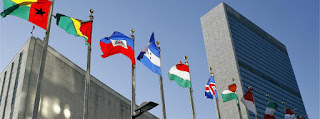As the most representative international organization and the utmost expression of multilateralism, the United Nations is the main instrument to address multifaceted and complex global challenges through collective action. 0401
◾■◾■◾■◾■◾
https://www.un.org/en/observances/Multilateralism-for-Peace-day
Background
The United Nations came into being in 1945, following the devastation of the Second World War, with one central mission: the maintenance of international peace and security.
The Charter of the United Nations states that one of the United Nations' purposes and principles is the commitment to settle disputes through peaceful means and the determination to succeeding generations from the scourge of war.
Conflict prevention remains, however, a relatively under-publicized aspect of the UN's work. Meanwhile, the most efficient and desirable employment of diplomacy is to ease tensions before they result in conflict, or, if conflict breaks out, to act swiftly to contain it and resolve its underlying causes.
Preventive diplomacy is very important in supporting United Nations efforts to assist in the peaceful settlement of disputes.
Commitment to multilateralism and international peace and security was also reaffirmed by most world leaders in the General Debate in September 2018. This commitment was also reinforced in the discussion during the High-level Dialogue on Renewing the Commitment to Multilateralism on 31 October 2018.

On 12 December 2018, the General Assembly adopted the resolution, "International Day of Multilateralism and Diplomacy for Peace" (A/RES/73/127) by a recorded vote of 144 in favour to 2 against.
By that text, the General Assembly invites all Member States, observers and organizations of the United Nations to observe the International Day in an appropriate manner and to disseminate the advantages of multilateralism and diplomacy for peace, including through educational and public awareness-raising activities.
❝
#PEACE #EDUCATION #DIPLOMACY #UN #HWPL #PEACE_WALK
❞






No comments:
Post a Comment